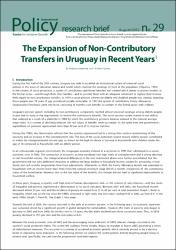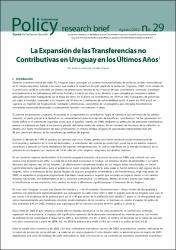Please use this identifier to cite or link to this item:
https://repositorio.ipea.gov.br/handle/11058/15799Files in This Item:
| File | Description | Size | Format | |
|---|---|---|---|---|
| en_IPCPolicyResearchBrief29.pdf | 159.99 kB | Adobe PDF |  View/Open | |
| es_IPCPolicyResearchBrief29.pdf | 161.75 kB | Adobe PDF |  View/Open |
| Title: | The Expansion of Non-Contributory Transfers in Uruguay in Recent Years |
| Other Titles: | La Expansión de las Transferencias no Contributivas en Uruguay en los Últimos Años |
| Authors: | Amarante, Verónica Vigorito, Andrea |
| Abstract: | During the first half of the 20th century, Uruguay was able to establish an institutional system of universal social policies in the areas of education, labour and health which involved the coverage of most of the population (Filgueira, 1994). In the context of social protection, a system of contributory cash-based transfers was created which aimed to protect workers in the formal sector—and through them their families—and to provide them with an adequate retirement to replace their income. With regard to non-contributory transfers, in 1919 a social pension scheme for elderly and disabled people was created, targeting those people over 70 years of age considered socially vulnerable. In 1942 the system of contributory Family Allowances (Asignaciones Familiares) came into force, consisting of monthly cash benefits to workers in the formal sector with children. (...) |
| metadata.dc.rights.holder: | International Policy Centre for Inclusive Growth United Nations Development Programme |
| metadata.dc.rights.license: | O texto e dados desta publicação podem ser reproduzidos desde que as fontes sejam citadas. Reproduções com fins comerciais são proibidas. |
| metadata.dc.type: | Policy Research Brief |
| Appears in Collections: | Publicações do IPC-IG |
Items in DSpace are protected by copyright, with all rights reserved, unless otherwise indicated.

